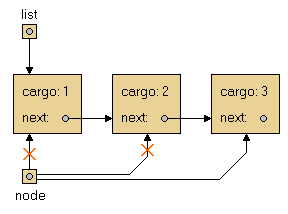| The C++Course provides a general introduction to programming in C++. It is based on A.B. Downey's book, How to Think Like a Computer Scientist. Click here for details. |

|

Home  Linked lists Linked lists  Lists as Collections Lists as Collections |
||






|
||
Lists as Collections
The thing that makes lists useful is that they are a way of assembling multiple objects into a single entity, sometimes called a collection. In the example, the first node of the list serves as a reference to the entire list.
Node *node = list; while (node != null) { cout << node->cargo; << endl; node = node->next; } } To invoke this method we just have to pass a reference to the first node: printList (node1);Inside printList we have a reference to the first node of the list, but there is no variable that refers to the other nodes. We have to use the next value from each node to get to the next node. This diagram shows the value of list and the values that node takes on:
This way of moving through a list is called a traversal, just like the similar pattern of moving through the elements of an array. It is common to use a loop variable like node to refer to each of the nodes in the list in succession. The output of this method is 123By convention, lists are printed in parentheses with commas between the elements, as in (1, 2, 3). As an exercise, modify printList so that it generates output in this format. As another exercise, rewrite printList using a for loop instead of a while loop.
|
||
Home  Linked lists Linked lists  Lists as Collections Lists as Collections |
||
Last Update: 2005-12-05


